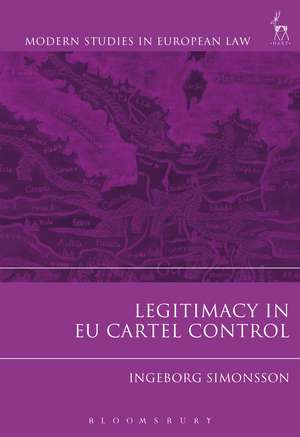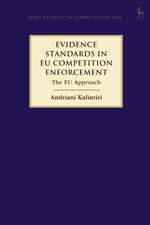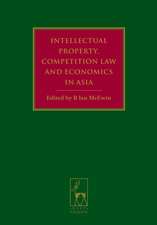Legitimacy in EU Cartel Control: Modern Studies in European Law
Autor Ingeborg Simonssonen Limba Engleză Hardback – 22 feb 2010
Din seria Modern Studies in European Law
- 19%
 Preț: 296.91 lei
Preț: 296.91 lei - 24%
 Preț: 440.21 lei
Preț: 440.21 lei - 31%
 Preț: 594.77 lei
Preț: 594.77 lei - 30%
 Preț: 570.22 lei
Preț: 570.22 lei -
 Preț: 181.55 lei
Preț: 181.55 lei - 30%
 Preț: 790.77 lei
Preț: 790.77 lei - 30%
 Preț: 507.97 lei
Preț: 507.97 lei - 30%
 Preț: 541.93 lei
Preț: 541.93 lei - 34%
 Preț: 509.45 lei
Preț: 509.45 lei - 30%
 Preț: 511.64 lei
Preț: 511.64 lei - 30%
 Preț: 721.14 lei
Preț: 721.14 lei - 30%
 Preț: 571.34 lei
Preț: 571.34 lei - 27%
 Preț: 475.10 lei
Preț: 475.10 lei - 30%
 Preț: 572.80 lei
Preț: 572.80 lei - 23%
 Preț: 418.50 lei
Preț: 418.50 lei - 11%
 Preț: 375.73 lei
Preț: 375.73 lei - 30%
 Preț: 575.75 lei
Preț: 575.75 lei - 19%
 Preț: 317.21 lei
Preț: 317.21 lei - 19%
 Preț: 296.72 lei
Preț: 296.72 lei - 18%
 Preț: 320.53 lei
Preț: 320.53 lei - 18%
 Preț: 321.66 lei
Preț: 321.66 lei - 30%
 Preț: 600.57 lei
Preț: 600.57 lei - 30%
 Preț: 512.22 lei
Preț: 512.22 lei - 30%
 Preț: 571.34 lei
Preț: 571.34 lei -
 Preț: 464.01 lei
Preț: 464.01 lei -
 Preț: 239.78 lei
Preț: 239.78 lei - 30%
 Preț: 538.03 lei
Preț: 538.03 lei - 30%
 Preț: 539.57 lei
Preț: 539.57 lei - 30%
 Preț: 595.65 lei
Preț: 595.65 lei - 30%
 Preț: 571.66 lei
Preț: 571.66 lei - 29%
 Preț: 587.97 lei
Preț: 587.97 lei - 30%
 Preț: 774.62 lei
Preț: 774.62 lei - 30%
 Preț: 570.43 lei
Preț: 570.43 lei - 30%
 Preț: 574.10 lei
Preț: 574.10 lei - 28%
 Preț: 495.80 lei
Preț: 495.80 lei - 30%
 Preț: 575.33 lei
Preț: 575.33 lei - 30%
 Preț: 571.24 lei
Preț: 571.24 lei - 30%
 Preț: 510.34 lei
Preț: 510.34 lei - 20%
 Preț: 219.19 lei
Preț: 219.19 lei - 30%
 Preț: 601.69 lei
Preț: 601.69 lei - 30%
 Preț: 513.60 lei
Preț: 513.60 lei - 18%
 Preț: 305.72 lei
Preț: 305.72 lei - 30%
 Preț: 972.83 lei
Preț: 972.83 lei - 30%
 Preț: 515.24 lei
Preț: 515.24 lei - 30%
 Preț: 539.99 lei
Preț: 539.99 lei - 30%
 Preț: 570.83 lei
Preț: 570.83 lei - 30%
 Preț: 571.82 lei
Preț: 571.82 lei - 29%
 Preț: 554.35 lei
Preț: 554.35 lei - 30%
 Preț: 572.06 lei
Preț: 572.06 lei
Preț: 1012.90 lei
Preț vechi: 1370.39 lei
-26% Nou
Puncte Express: 1519
Preț estimativ în valută:
193.84€ • 210.48$ • 162.83£
193.84€ • 210.48$ • 162.83£
Carte tipărită la comandă
Livrare economică 22 aprilie-06 mai
Preluare comenzi: 021 569.72.76
Specificații
ISBN-13: 9781849460057
ISBN-10: 1849460051
Pagini: 440
Dimensiuni: 156 x 234 x 34 mm
Greutate: 0.82 kg
Ediția:New.
Editura: Bloomsbury Publishing
Colecția Hart Publishing
Seria Modern Studies in European Law
Locul publicării:London, United Kingdom
ISBN-10: 1849460051
Pagini: 440
Dimensiuni: 156 x 234 x 34 mm
Greutate: 0.82 kg
Ediția:New.
Editura: Bloomsbury Publishing
Colecția Hart Publishing
Seria Modern Studies in European Law
Locul publicării:London, United Kingdom
Notă biografică
Ingeborg Simonsson is one of Sweden's leading experts in competition law. She is a Judge of the Stockholm City Court, Division for competition law and intellectual property, and Associate Professor in competition law at the University of Stockholm. She previously worked for six years in private practice and for five years worked as a full time academic.
Cuprins
1 The Method I. Why legitimacy is needed in EC competition law II. Basic methodology A. The discussion of legitimacy in contemporary European law and its application to this work B. Comparative legal studies: US antitrust law 2 The Role of Legitimacy in Decentralisation I. Exploring legitimacy A. Modernisation sought to remedy a legitimacy deficit B. Uniformity as a cornerstone of Regulation 1 1. The travaux préparatoires 2. What is uniformity? 3. Defining the relation between EC law and national law C. Effectiveness as the other cornerstone of Regulation 1 D. Efficiency E. Action against hard-core infringements as a top priority 1. A choice of law provision 2. Engaging national authorities in EC competition law supervision 3. Strengthened investigative powers of the Commission F. Preliminary conclusion: output orientated legislation II. A focus on hard-core restraints as a study object III. Judicial co-operation and legitimacy IV. Prerequisites for ensuring average compliance A. Importance of institutional structure and human resources B. The principle of institutional autonomy and Regulation 1 V. Efficiency: ECN and the Commission's central supervision and enforcement mechanisms A. ECN co-operation B. The Commission's powers in relation to national competition authorities and courts 1. Enforcement priorities following decentralisation VI. Leniency and settlement procedures lead back to centralized enforcement VII. Institutional aspects A. The Commission's role in EC competition law 1. To be the primary force in EC competition law control 2. To co-ordinate decentralised enforcement 3. To supervise the guarantees in Member States for well-functioning competition law enforcement 4. Article 234 cases referred to the Court of Justice and amicus curiae observations 5. Peer pressure and benchmarking 6. International co-operation 7. Law and policy development VIII. A roadmap 3 Testing Legitimacy of the Policy Pursued I. Whether the fight against cartels is legitimate in a deeper sense A. Cartels: an introduction B. Empirical legitimacy: international discussions, experiences and policies C. Economic perspectives and some facts and figures on cartels and cartel law enforcement 1. Allocative inefficiencies resulting from cartels 2. X-efficiency and social costs resulting from cartels 3. Cartel frequency and geographic impact 4. Empirical studies on cartel duration 5. Probability of detection 6. On cartel profits and overcharges 7. Empirical studies of overcharges 8. Cartel formation and cartel stability D. Moral aspects of cartel behaviour II. Contrasting perspectives A. Cartels versus tacit collusion B. Cartels versus merger control and abuse of dominance C. Cartels versus vertical restraints III. Collapsing the cartel concept A. Horizontal behaviour with the object of restricting competition 1. Price-fixing 2. Quotas and other output limitation 3. Market sharing including bid-rigging 4. Buyer cartels 5. Boycotts and other joint exclusionary conduct 6. Facilitating practices including information exchange 7. Mixed horizontal and vertical cartels 8. Single brand dealer cartels B. Cartels as naked restraints without redeeming virtues 1. Article 81(3) EC and cartels 2. The decision-making on exemptions for cartels 3. Cases before the Community courts where cartels were notified and tried under Article 81(3) EC C. Conclusion: cartel control as a structural remedy 1. Trade associations 2. Permitted forums for concertation-shipping cartels 3. Cartels stemming from sector regulation and other forms of government intervention 4. Summing up on cartel control as structural rather than behavioural D. Defining cartels IV. Summary and conclusions 4 Legitimacy of Substantive Cartel Law I. Per se or not per se A. What is a per se prohibition? B. The development towards a per se prohibition in EC law 1. De minimis for hard-core restraints? 2. Whether market definitions are necessary in cartel cases 3. Assessment in the legal and economic context for hard-core restraints? 4. Use of economic analysis in hard-core restraint cases 5. Analysis: per se prohibition or effects-based approach? II. Agreements and concerted practices, decisions by associations of undertakings A. Agreements 1. Decision-making meetings; opt-out necessary B. Decisions by associations of undertakings C. Concerted practices 1. Opt-out not possible for concerted practices, including information exchange D. Complex infringements1. Opt-out necessary for complex infringements E. One or several cartels? F. Small, marginal players 1. Parties forced to join G. Unilateral versus joint market conduct H. 'No authority to bind the principal' argument I. Collaborators J. Legal requirements for withdrawing from a cartel K. Conclusion: a deterrence-based substantive policy III. Jurisdiction IV. Effect on trade A. Jurisprudence on effect on trade 1. Some basic aspects 2. Cross-border infringements 3. Domestic practices 4. Local practices 5. Export cartels 6. The conflict between classic integration and welfare economics in the present case law B. Presenting a deterrence theory on effect on trade V. When do Articles 81 and 82 EC apply to cartels? A. Parallel application 1. National competition law and Community competition law B. Undertakings 1. Outside Articles 81 and 82 EC: collective agreements, authorities, social security systems and certain purchasers 2. Severability between economic activities and other activities C. Agriculture D. State action defence E. Conclusion: delimiting Article 81 EC is not deterrence based VI. Responsibility for related companies: lifting the corporate veil A. Responsibility for subsidiaries and other related companies B. Change of ownership: acquirer's and seller's responsibility C. Liability when two or more companies in the same group participate D. Conclusion: attribution of liability is deterrence based VII. Conclusions 5 Legitimacy and Evidentiary Standards I. The relation in principle between Community law and national law on evidence A. Uniformity, effectiveness, fundamental rights and procedural autonomy-a balancing act B. Ascertaining the facts and determining the relevance of facts of a case-a division of functions C. Burden of proof and presumption of innocence 1. Opt-out principle and presumption of pursuant market behaviour-the nature of the rules created by the Court of JusticeD. Standard of proof E. Standard of legal review F. Preliminary conclusions II. The emergence of a Community law on evidence in cartel cases A. Principles-a discussion B. The standard of proof and general methodology for evaluating evidence in cartel cases 1. Evidence taken together 2. Direct versus indirect evidence 3. Parallel behaviour 4. Standard of proof for demonstrating a role as an instigator or a ringleader of a cartel 5. Standard of proof for demonstrating participation in a complex infringement 6. Standard of proof for demonstrating duration 7. Standard of proof for cartel overcharges 8. Circumstantial evidence, indicia 9. Refusal to reply C. Cartel cases where the Commission lost in substance D. Evaluation of certain pieces of evidence 1. Whether the practice was in the company's interest 2. Whether some caution is called for in relation to evidence submitted under a leniency application 3. Probative value of corporate statements made by representative who did not participate himself 4. Anonymous informers III. Comparisons with Community law principles on evidence in cases on hard-core vertical restraints, State aid and merger control IV. Summary, discussion and conclusions 6 Legitimacy and the Relation between National Competition Procedure and EC Law I. Empirical legitimacy of EC antitrust procedure A. The references to national law in Regulation 1 II. Normative legitimacy-uniformity, effectiveness and national procedural autonomy III. Fundamental rights and national procedure A. Rights of the defence 1. Non-applicability of the rights of defence in private litigation IV. The emergence of a common set of rules applicable in competition procedure A. Investigatory powers-Member State discretion 1. Necessary inspections and investigations 2. Right to legal representation 3. Duty to state reasons in decisions authorising investigations 4. The undertaking's duty to co-operate 5. Extent of the investigatory powers B. Legal professional privilege C. Assistance by national authorities 1. Information obtained from Member State authorities D. Incriminating questions 1. What is an incriminating question? 2. Legal consequences if incriminating questions are asked 3. Information supplied voluntarily 4. Use of evidence collected in non-EU jurisdictions E. Use of unlawfully obtained evidence 1. Obligation to exclude evidence in national proceedings-the Steffensen principle 2. Rights of the defence can be precluded if an undertaking fails to use available legal remedies 3. Confidentiality as to the origin of evidence 4. Obligation to return unlawfully obtained documents and information? 5. Incriminating questions-statements by natural persons 6. Indirect use of unlawfully obtained evidence F. Witness statements 1. Right to cross-examine a witness G. Unlawful procedural steps taken before 1 May 2004 H. Statement of objections, applicability of Community case law in national procedure I. Access to file 1. Access to file and the adversarial principle 2. Consequences of failure to provide access to documents J. Right to be heard 1. Preclusion of the procedural right to dispute the allegations K. Languages-specific problems arising from multinational cartel cases L. Duty to investigate exculpatory facts M. Sound administration N. Duty to act within reasonable time O. Limitation periods P. Duty to state reasons Q. Legitimate expectations and legal certainty V. Summary, discussion and conclusions 7 Legitimacy in Fines and Sanctions I. Enforcement and legitimacy II. The relation between national law and Community law on fines and other sanctions A. National law governs fines and sanctions imposed in Member States B. Effectiveness requirements C. The purpose of fines D. Significance of the economic impact of the infringement 1. A line of cases playing down the importance of actual effects 2. New developments: a 'but for' approach 3. Economic analysis and fines E. Member States' discretionary power equals that of the Commission III. Efficiency: theories and empirical observations on fining policy A. Deterrence 1. The basic theory and available empirical support 2. The harm-based approach 3. The gain-based approach 4. Problems with the deterrence model 5. Criminology and cartel behaviour B. Retribution 1. The basic theory 2. The problems with retributive theory 3. The Commission's 1998 fining guidelines 4. Conclusions on retributive theory in competition law C. Collaborative compliance techniques and trade associations D. Behavioural law and economics E. Conclusion: efficient competition law fines F. What type of bird is the Commission's 2006 fining policy? IV. Efficiency through detection-leniency A. Relation between national law and Community law B. Efficiency considerations V. Intention/negligence A. National law or Community law issue? B. Case law of the Community courts VI. General principles of Community law applicable when Member States impose fines A. Foreseeability and legal certainty B. Legitimate expectations C. Individual assessment and non-discrimination D. Statement of reasons E. Principle of proportionality and equal treatment F. Legality G. Ne bis in idem H. Conclusions on general principles applicable when Member States penalise infringements VII. Other principles of relevance when fines are imposed in Member States A. How serious is a domestic cartel? B. Ringleaders and instigators C. Trade associations D. Reference year for calculation of fines VIII. Is there a need for harmonised sanctions? IX. Summary, discussion and conclusions 8 Sourcing LegitimacyI. Where to find the legitimate genesis of the law in EC cartel control A. The integration objective B. Reliance on precedents C. Economic theory and empirical observations D. Legal theory E. Internal rationality of the law F. Comparative law G. Common legal traditions in Member States H. International standards including the ECHR II. Democracy, participation, transparency III. Ensuring average compliance as an outflow of ensuring the law's rationality? A. What exactly is renationalisation? B. Evaluating the relation between uniformity, effectiveness and efficiency in EC competition law C. The role of harmonised procedure D. The current system is implicitly based on a case-by-case approach E. An enforcement deficit identified F. Conclusion: not even increased rationality of the law will cure the enforcement deficit G. A definition of efficient EC cartel control H. Has the Commission pursued a legitimate enforcement strategy against cartels? I. Supervision and enforcement through best-performing national authorities J. The role of Member States in an efficient decentralised system IV. Integration or competition as a policy base A. Decentralisation meant a shift in emphasis from integration policy to welfare economics B. A modernised view of the role of integration in competition law V. Discussion VI. Final conclusion
Recenzii
...Simonsson offers interesting insights into the legal, economic and political theories underpinning EC competition law. The book is well structured and logically constructed...the book is a very welcome contribution in this rapidly evolving area of law. It satisfies the needs of private practice, institutional actors and academia. It brings together the experience and skills of the author to shed light on the complexities and inefficiencies following the modernization. To be sure, although the normative and jurisprudential framework has undergone notable changes following the publication of the book, the evolution seems to go precisely in the direction suggested by the author.
... a single-minded, well-developed, robustly-supported anaylsis of cartel law and its enforcement in the European Union today.
The publication provides both theoretical and practical approaches with regard to around 150 Union decisions in this area and frequently plunges into pertinent academic literature for its findings. Ingeborg Simonsson also gives the reader some detailed comparisons of European and American law and in doing so provides us with a remarkable reference book.
... a single-minded, well-developed, robustly-supported anaylsis of cartel law and its enforcement in the European Union today.
The publication provides both theoretical and practical approaches with regard to around 150 Union decisions in this area and frequently plunges into pertinent academic literature for its findings. Ingeborg Simonsson also gives the reader some detailed comparisons of European and American law and in doing so provides us with a remarkable reference book.
Descriere
This book examines the law developed by the EU to control cartels. The law, including case-law, is carefully documented and analysed.




















